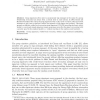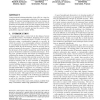61 search results - page 4 / 13 » A Machine-Checked Formalization of the Random Oracle Model |
150
click to vote
CANS
2009
Springer
15 years 21 days ago
2009
Springer
Group signatures allow users to anonymously sign messages in the name of a group. Membership revocation has always been a critical issue in such systems. In 2004, Boneh and Shacham...
115
click to vote
ASIACRYPT
2006
Springer
15 years 6 months ago
2006
Springer
Understanding what construction strategy has a chance to be a good hash function is extremely important nowadays. In TCC'04, Maurer et al. [13] introduced the notion of indiff...
134
Voted
CRYPTO
2000
Springer
15 years 7 months ago
2000
Springer
Partially blind signature schemes are an extension of blind signature schemes that allow a signer to explicitly include necessary information (expiration date, collateral condition...
118
click to vote
CCS
2010
ACM
15 years 3 months ago
2010
ACM
Computational Indistinguishability Logic (CIL) is a logic for reasoning about cryptographic primitives in computational models. It captures reasoning patterns that are common in p...
131
click to vote
EUROCRYPT
2008
Springer
15 years 4 months ago
2008
Springer
Standard security notions for encryption schemes do not guarantee any security if the encrypted messages depend on the secret key. Yet it is exactly the stronger notion of security...


